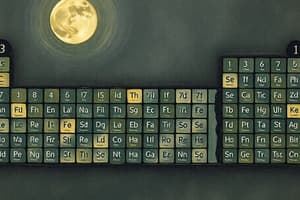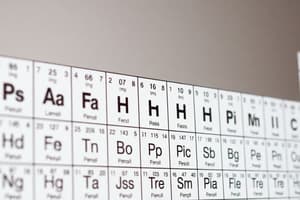Podcast
Questions and Answers
How are elements arranged in the periodic table?
How are elements arranged in the periodic table?
- By atomic number and chemical and physical properties (correct)
- By group and period
- By number of energy levels and valence electrons
- By atomic mass and reactivity
Which category of elements is located on the left side of the periodic table?
Which category of elements is located on the left side of the periodic table?
- Metals (correct)
- Nonmetals
- Transition metals
- Metalloids
What are the elements touching the zigzag line in the periodic table called?
What are the elements touching the zigzag line in the periodic table called?
- Transition metals
- Alkali metals
- Metalloids (correct)
- Halogens
How are electrons arranged around the nucleus of an atom?
How are electrons arranged around the nucleus of an atom?
What determines the reactivity of an element and how it will form compounds?
What determines the reactivity of an element and how it will form compounds?
How many electrons can the first energy level hold?
How many electrons can the first energy level hold?
How are elements grouped in the periodic table?
How are elements grouped in the periodic table?
Which part of an atom are elements identified by?
Which part of an atom are elements identified by?
What are the elements located on the right side of the periodic table called?
What are the elements located on the right side of the periodic table called?
What do the electrons in the outermost energy level of an atom determine?
What do the electrons in the outermost energy level of an atom determine?
What determines the valence electrons in each group of the periodic table?
What determines the valence electrons in each group of the periodic table?
Which group contains alkali metals with 1 valence electron?
Which group contains alkali metals with 1 valence electron?
Where are the transition metals found in the periodic table?
Where are the transition metals found in the periodic table?
Which group contains the noble gases?
Which group contains the noble gases?
What are the characteristics of metalloids?
What are the characteristics of metalloids?
Which groups contain the most reactive nonmetals?
Which groups contain the most reactive nonmetals?
Where are the Lanthanide and Actinide series placed in the periodic table?
Where are the Lanthanide and Actinide series placed in the periodic table?
What determines the reactivity of elements in the periodic table?
What determines the reactivity of elements in the periodic table?
Where are the halogens located in the periodic table?
Where are the halogens located in the periodic table?
What are the characteristics of alkaline-earth metals?
What are the characteristics of alkaline-earth metals?
Flashcards are hidden until you start studying
Study Notes
The Periodic Table and Element Properties
- The periodic table is divided into 18 groups, each with a corresponding number.
- Valence electrons in each group are determined by the group number, with specific patterns.
- Reactivity of elements is determined by the number of valence electrons and their stability.
- Group 1 and 2 elements are the most reactive metals, while Groups 16 and 17 are the most reactive nonmetals.
- Elements in the same group have similar chemical behaviors due to the same number of valence electrons.
- Group 1 contains alkali metals, which are very reactive and have 1 valence electron.
- Group 2 contains alkaline-earth metals, which are also reactive and have 2 valence electrons.
- Transition metals, found in Groups 3-12, are less reactive and have higher density and conductivity.
- Lanthanide and Actinide series are placed below the main table and contain very reactive and unstable elements.
- Metalloids, found in Groups 13-16, have characteristics of both metals and nonmetals.
- Halogens in Group 17 are very reactive nonmetals and never found uncombined in nature.
- Noble gases in Group 18 are nonreactive and have full outer energy levels.
Studying That Suits You
Use AI to generate personalized quizzes and flashcards to suit your learning preferences.




